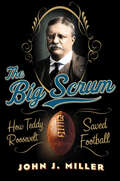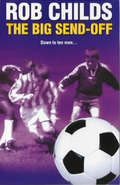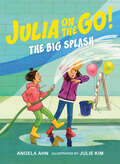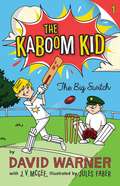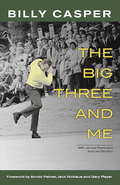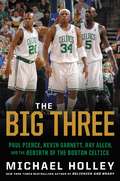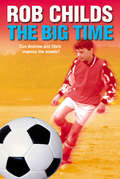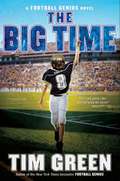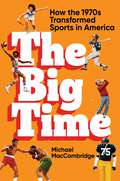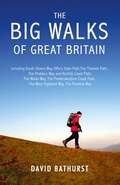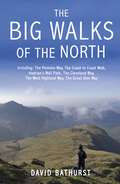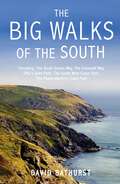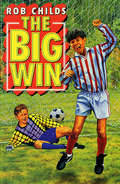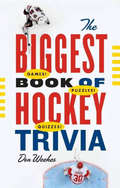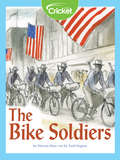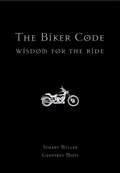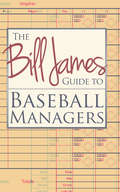- Table View
- List View
The Big Scrum: How Teddy Roosevelt Saved Football
by John J. Miller“The story . . . has as much vigor and passion as Roosevelt himself. It’s a fascinating and thoroughly American tale.” —Candice Millard, New York Times–bestselling authorJohn J. Miller delivers the intriguing, never-before-told story of how Theodore Roosevelt saved American Football—a game that would become the nation’s most popular sport. Miller’s sweeping, novelistic retelling captures the violent, nearly lawless days of late 19th century football and the public outcry that would have ended the great game but for a crucial Presidential intervention. Teddy Roosevelt’s championing of football led to the creation of the NCAA, the innovation of the forward pass, a vital collaboration between Walter Camp, Charles W. Eliot, John Heisman and others, and, ultimately, the creation of a new American pastime. Perfect for readers of Douglas Brinkley’s Wilderness Warrior, Michael Lewis’s The Blind Side, and Conn and Hal Iggulden’s The Dangerous Book for Boys, Miller’s The Big Scrum reclaims from the shadows of obscurity a remarkable story of one defining moment in our nation’s history. “The first complete account of Roosevelt’s football rescue . . . a great story.” —The Wall Street Journal“Fascinating . . . At a time when a coalition of suburban soccer moms and misguided caretakers of American athletics are hell-bent on watering down the game of football, you should take the time to read this book.” —Sal Paolantonio, ESPN“A richly detailed history of football’s founding . . . a useful primer, introducing us to some of the sport’s most famous pioneers.” —The New York Times“Enjoyable history of a seldom explored turning point in American sports history.” —Booklist
The Big Send-Off
by Rob ChildsOff! Off! Off!Danebridge school football team - captained by goalie Chris Weston - have had a shaky season in the League, but a good Cup run. Now they face a crucial semi-final replay - a match they must win if they are to meet their arch-rivals, Shenby, in the Final. Will Chris lift the Cup? Find out what happens in this new action-packed story in the bestselling BIG soccer series - everything from a nerve-jangling penalty shootout to a shock sending-off!
The Big Splash (Julia on the Go!)
by Angela AhnJulia and her swim team struggle with a new strict coach, but she is determined to make a big splash regardless in this buoyant illustrated chapter book for ages 7 and up. For fans of Mindy Kim and Jasmine Toguchi.Julia is dismayed to learn that Coach Marissa has to leave the Vipers swim team for an urgent family matter. Coach Nathan, their new temporary coach, is strict and humorless. He doesn't even let them have Splash Time! And it's not just Julia who's upset — two of her teammates have even quit the team. So it's no surprise that the team is not enthusiastic when Coach Nathan asks them to put together a car wash fundraiser for the team.But then they learn that there's going to be a big increase in pool rental fees, which means the Vipers may lose practice days, or worse, not be able to swim at all. Julia takes the lead and gets the Vipers organized. Along the way, she learns more about her nemesis, teammate Olivia, and even Coach Nathan. Maybe first impressions aren't always the most accurate.
The Big Stretch
by Duane DeckerBlue Sox 6. Ex-bat-boy, Buster Stookey, has a chance to play 1st base for the Blue Sox. He's replacing Marty Blake and it won't be easy even if Blake has become a human sieve. Blake can still hit the long ball and the fans still love him--so does the front office.
The Big Switch: Kaboom Kid #1
by David WarnerMeet Little Davey Warner. He lives in Sandhill Flats with his mum and dad and his brother Steve - and his stinky dog Max. Davey and his schoolmates -even Max - are MAD for cricket. All they want to do is play ... but there's always something getting in their way. In this first book in the series, Davey and his friends have a big game coming up against Shimmer Bay, their arch rivals in the local comp. They need to practise, and spend all their free time at school - in the morning and at lunchtime - making sure they'll be ready. But disaster strikes. Davey and his friends find out their new teacher is Mr Mudge, a strict grump who HATES cricket even more than he hates Year 6 boys, and thanks to bully Mo Clouter, they find themselves on detention. Which means no cricket. The boys are desperate. They're going to need to pull something special out of the bag to win against Shimmer Bay. Davey's mates have some ideas, one that could really get them into trouble, but it means getting around Mo, who seems to be everywhere they turn. But Davey has an idea that he thinks may just work ... he just needs to practise. Will he pull it off in time for the game against Shimmer Bay?
The Big Tee Ball Game
by Larry Dane BrimnerGabby discovers that cheating at tee-ball is not the best way to win.
The Big Three and Me
by Billy Casper James Parkinson Lee BensonThe Big Three and Me by Billy Casper, with James Parkinson and Lee Benson
The Big Three and Me
by Billy CasperBilly Casper had a higher winning percentage than Arnold Palmer, he won twice as many times on the PGA Tour as Gary Player, and during his career he finished in the top twenty-five more consistently than Jack Nicklaus. And yet, when golf historians write about the legends of the game, with special attention paid to the above-listed "Big Three," his name is often left out of the discussion, or is at best an afterthought.In this fascinating autobiography, Casper tells his life story, shining candid insight into the man who quietly collected fifty-one PGA Tour victories, the seventh highest total in history.
The Big Three: Paul Pierce, Kevin Garnett, Ray Allen, and the Rebirth of the Boston Celtics
by Michael HolleyNew York Times bestselling sportswriter Michael Holley tells the inside story of how Paul Pierce, Ray Allen, and Kevin Garnett joined together to form the most dominant team in basketball and lead the Boston Celtics to their first championship in more than two decades.The first of "The Big Three" was Paul Pierce. As Boston Celtics fans watched the team retire Pierce's jersey in a ceremony on February 11, 2018, they remembered again the incredible performances Pierce put on in the city for fifteen years, helping the Celtics escape the bottom of their conference to become champions and perennial championship contenders. But Pierce's time in the city wasn't always so smooth. In 2000, he was stabbed in a downtown nightclub eleven times in a seemingly random attack. Six years later, remaining the sole star on a struggling team, he asked to be traded and briefly became a lightning rod among fans.Then, in 2007, the Boston Celtics General Manager made two monumental trades, bringing Ray Allen and Kevin Garnett to Boston. A press conference on July 31, 2007 was a sight to behold: Pierce, KG, and Ray Allen holding up Celtics jerseys for the flood of media. Coach Doc Rivers made sure the team bonded over the thought of winning a title and living by a Bantu term called Ubuntu, which translates as "I am because we are." Rivers wanted to make it clear that togetherness and brotherhood would help them maximize their talent and win. What came next -- the synthesis of the Celtics' "Big Three" and their dominant championship run -- cemented their standing as one of great teams in NBA history, a rival to Kobe Bryant's Lakers and LeBron James's Cavaliers.This is the team that brought excitement back to the Garden, and therefore to one of the most storied franchises in all of sports. They met their historic rivals, the Lakers, in the 2008 NBA Finals, winning the series in Game 6, in a rout on their home court with a raucous, concert like atmosphere. Along the victory parade route, Paul Pierce smoked a cigar -- as a tribute to legendary former Celtics Coach Red Auerbach. In a city now defined by a wealth of championships, "The Big Three" joined the club. Michael Holley, the premier chronicler of Boston sports, brings their story to life with countless untold stories and behind-the-scenes details in another bestselling tome for New England and sports fans across the country.
The Big Time
by Rob Childs"THIS IS WHERE WE BELONG - IN THE BIG TIME!"Andrew and Chris Weston have both been invited to attend a special summer coaching course at one of the country's top football clubs. The brothers are determined to give it their best shot, hoping to impress United's scouts. Another bonus is the chance to be ball boys at a World Cup qualifying match between England and Holland. But the big event turns out to be even more explosive than anyone could ever have guessed...!
The Big Time
by Tim GreenThings couldn't be going better for Troy White. <P><P>The Atlanta Falcons' football genius is at the top of his game, helping the team get to the playoffs. Agents and lawyers are knocking on his door with big-money offers for the upcoming season. And his own football team has just won the Georgia State Championship! <P><P>Troy's celebrating with his friends at linebacker Seth Halloway's mansion when another lawyer comes knocking-and he says, "I think I'm your father." <P><P> In that instant, Troy's life is changed. <P><P> Powerfully charged from start to finish, this is an amazing portrayal of Troy's struggle to make his lifetime dreams of being with his father come true. Filled with page-turning excitement as a high-stakes deal increases the clash of family tension, The Big Time is an unforgettable experience.
The Big Time: How the 1970s Transformed Sports in America
by Michael MacCambridge&“Indispensable history.&” –Sally Jenkins, bestselling author of The Right Call A captivating chronicle of the pivotal decade in American sports, when the games invaded prime time, and sports moved from the margins to the mainstream of American culture. Every decade brings change, but as Michael MacCambridge chronicles in THE BIG TIME, no decade in American sports history featured such convulsive cultural shifts as the 1970s. So many things happened during the decade—the move of sports into prime-time television, the beginning of athletes&’ gaining a sense of autonomy for their own careers, integration becoming—at least within sports—more of the rule than the exception, and the social revolution that brought females more decisively into sports, as athletes, coaches, executives, and spectators. More than politicians, musicians or actors, the decade in America was defined by its most exemplary athletes. The sweeping changes in the decade could be seen in the collective experience of Billie Jean King and Muhammad Ali, Henry Aaron and Julius Erving, Kareem Abdul-Jabbar and Joe Greene, Jack Nicklaus and Chris Evert, among others, who redefined the role of athletes and athletics in American culture. The Seventies witnessed the emergence of spectator sports as an ever-expanding mainstream phenomenon, as well as dramatic changes in the way athletes were paid, portrayed, and packaged. In tracing the epic narrative of how American sports was transformed in the Seventies, a larger story emerges: of how America itself changed, and how spectator sports moved decisively on a trajectory toward what it has become today, the last truly &“big tent&” in American culture.
The Big Walks of Great Britain
by David BathurstAn indefatigable walker, David Bathurst has unlaced his boots to produce this invaluable companion to the fifteen best-loved long-distance footpaths of Great Britain. His appreciation of the British countryside and light-hearted style will appeal to novice and experienced walkers alike.
The Big Walks of Great Britain
by David BathurstAn indefatigable walker, David Bathurst has unlaced his boots to produce this invaluable companion to the fifteen best-loved long-distance footpaths of Great Britain. His appreciation of the British countryside and light-hearted style will appeal to novice and experienced walkers alike.
The Big Walks of the North
by David BathurstDavid Bathurst has unlaced his boots to produce this definitive companion to the ten best-loved long-distance footpaths in the north of Britain, with each split into manageable sections. Combining detailed descriptions with an appreciation of the beauty and history of the British countryside, this in an indispensable guide for all walkers.
The Big Walks of the North
by David BathurstDavid Bathurst has unlaced his boots to produce this definitive companion to the ten best-loved long-distance footpaths in the north of Britain, with each split into manageable sections. Combining detailed descriptions with an appreciation of the beauty and history of the British countryside, this in an indispensable guide for all walkers.
The Big Walks of the South
by David BathurstDavid Bathurst has unlaced his boots to produce this definitive companion to the ten best-loved long-distance footpaths in the south of Britain, with each split into manageable sections. Combining detailed descriptions with an appreciation of the beauty and history of the British countryside, this in an indispensable guide for all walkers.
The Big Walks of the South
by David BathurstDavid Bathurst has unlaced his boots to produce this definitive companion to the ten best-loved long-distance footpaths in the south of Britain, with each split into manageable sections. Combining detailed descriptions with an appreciation of the beauty and history of the British countryside, this in an indispensable guide for all walkers.
The Big Win
by Rob ChildsWho cares about losing when you're a millionaire?'Chris Weston, goalkeeper and school team captain, has problems. With Danebridge too close for comfort to the relegation zone, they're facing two key games in a week - and most of the players seem to have other things on their minds right now. Two million of them. For midfielder Mark Towers has just struck lucky. His family have won the Lottery! Chris would prefer a different kind of big win - on the football pitch. Can they all pull together as a team before it's too late?
The Biggest Book of Hockey Trivia
by Don WeekesHockey trivia master Don Weekes has cherry-picked more than 800 of his most compelling trivia questions and records to create this authoritative collection. Who was the only player to captain Steve Yzerman in NHL play? When did a forward or defenseman last tend goal during an NHL game? What is the time of the fastest goal from the start of a season-opening game? Irreverent, captivating, and even bizarre, these entertaining stories, historic milestones, and informative stats capture the essence of the game, today and yesterday.
The Bike Soldiers
by Pferron DossDid you know that in the late nineteenth century, the United States military used bikes to travel from one place to another? They were a new invention and a quicker way to travel than walking. Lieutenant James Moss and twenty soldiers tested the durability of bikes by traveling through six states from the West to the Midwest to prove its usability in the military.
The Bike to Work Guide
by Roni Sarig Paul DornBiking to work can save someone loads of money and lots of calories - all the while, the earth, too. But bike-commuting isn't always easy - there are many things a rider needs to know to get to work on time, safely, and happily. Expert bikers Roni Sarig and Paul Dorn teach potential bikers the tips and tricks to traveling to and from work. From buying the right bike, to fueling the body, to road safety, this all-inclusive primer will get bikers on the road in no time. Whether someone is buying a first bike or is a bicycle enthusiast, this book will teach how to: buy the right equipment; pick a route; weather-proof the ride; maintain the bike; follow traffic laws and ride safely; and enjoy the experience! Like a roadmap for the future, this guide teaches bikers how to make a difference in their bodies, wallets, and communities - and get to work - today.
The Bike to Work Guide: Save Gas, Go Green, Get Fit
by Roni Sarig Paul DornBiking to work can save someone loads of money and lots of calories - all the while, the earth, too. But bike-commuting isn’t always easy - there are many things a rider needs to know to get to work on time, safely, and happily. Expert bikers Roni Sarig and Paul Dorn teach potential bikers the tips and tricks to traveling to and from work. From buying the right bike, to fueling the body, to road safety, this all-inclusive primer will get bikers on the road in no time. Whether someone is buying a first bike or is a bicycle enthusiast, this book will teach how to: buy the right equipment; pick a route; weather-proof the ride; maintain the bike; follow traffic laws and ride safely; and enjoy the experience! Like a roadmap for the future, this guide teaches bikers how to make a difference in their bodies, wallets, and communities - and get to work - today.
The Bill James Guide to Baseball Managers
by Bill JamesThe man Newsweek once called “the guru of baseball” offers profiles of top managers, sidebars, statistics, and snapshots of each decade. Widely considered to be one of the greatest minds in the history of the game, Bill James has changed the way we think about the sport of baseball. In this chronicle of field generals, strategists, and occasional cannon fodder, James writes with piercing insight about the men who hold what may be the most important spot in the dugout. For nearly forty years, James has led the vanguard of how we measure the game. From sabermetrics to his Baseball Abstracts, James has influenced even the casual fan all the way up to the top brass. Somewhere in the middle of that spectrum, however, is the manager, and Bill James has penned a guide on some of the most innovative and renowned men to ever hold that position. Some of the game’s greatest managers have been Hall of Fame players who put down a bat and picked up a lineup card: Frank Robinson, Mel Ott, Joe Cronin, Tris Speaker, and Rogers Hornsby. Others have achieved greatness from their ability to assemble legendary teams: Billy Martin, Tommy Lasorda, Connie Mack, Joseph McCarthy, Dick Williams, and Leo Durocher. Here, Bill James explores the history of the manager, and its evolution from 1870–1990, in a decade-by-decade chronicle, examining the successes, the failures, and what baseball fans can learn from both. The Bill James Guide to Baseball Managers is a thought-provoking, entertaining, and seminal guide to a vital part of the national pastime, written by one of its most groundbreaking iconoclasts. “A delightful collection that will satisfy baseball fans of all ages.” —Library Journal
